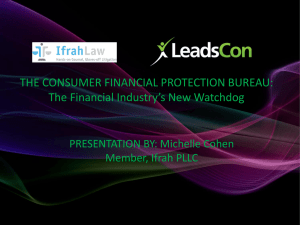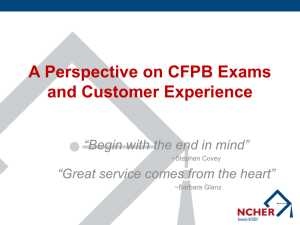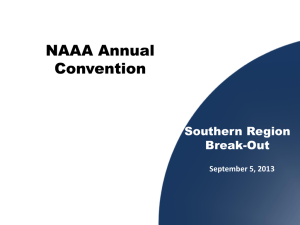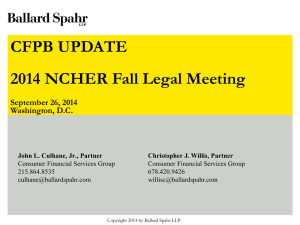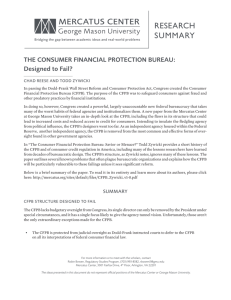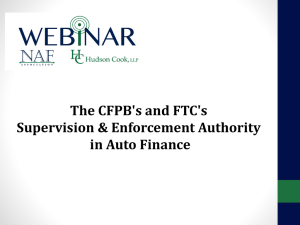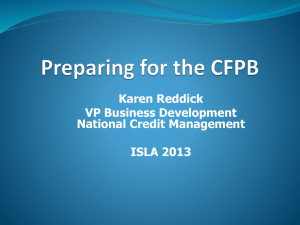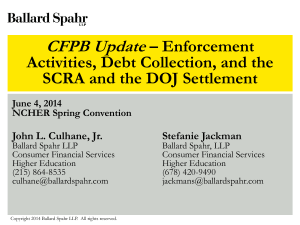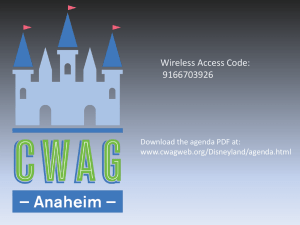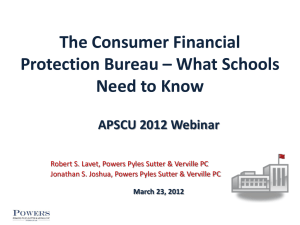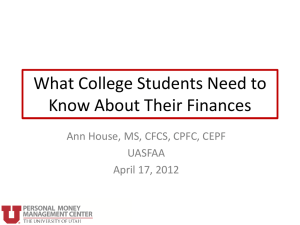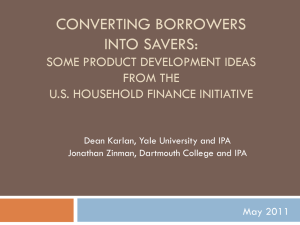Fair Debt Collection Practices Clarification Act of 2012
advertisement
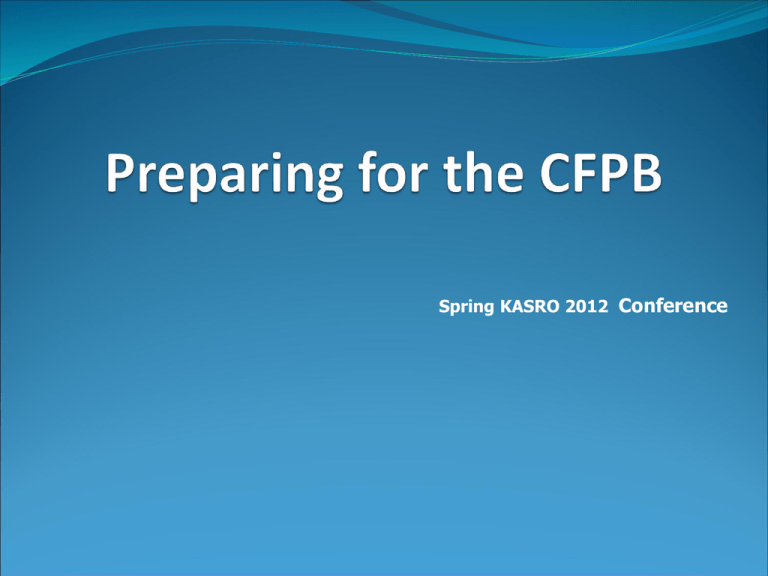
Spring KASRO 2012 Conference DISCLAIMER The information presented in this session represents the views and opinions of the presenters and does not constitute the opinion or endorsement of, or promotion by Todd, Bremer & Lawson, Inc. or the presenter. This session is for information purposes only and should not be construed as legal advice. The reader or audience participant is encouraged to consult with legal counsel before making any policy decisions based on the information contained herein. Consumer Financial Protection Bureau CFPB Created by Dodd-Frank Wall Street Reform and Consumer Protection Act of 2010 Independent bureau within Federal Reserve System, run by Director who is Presidential Appointee, confirmed by Senate. Authority to issue rules for all financial institutions, including rules under Truth in Lending Act, Fair Debt Collection Practices Act, Equal Credit Opportunity and Real Estate Settlement Procedures Act. Section 1021 of Dodd Frank Act CFPB is authorized to exercise its authorities for the purpose of ensuring that: 1) Consumers are provided with timely and understandable information to make responsible decisions about transactions involving consumer financial products and services; (2) Consumers are protected from unfair, deceptive, or abusive acts and practices and from discrimination; (3) Outdated, unnecessary, or unduly burdensome regulations concerning consumer financial products and services are regularly identified and addressed in order to reduce unwarranted regulatory burdens; (4) Federal consumer financial law is enforced consistently, without regard to status as a depository institution, in order to promote fair competition; and (5) Markets for consumer financial products and services operate transparently and efficiently to facilitate access and innovation. Scope Of CFPB’s Duties The CFPB supervises banks with more than $10 billion of assets, credit unions, and other non-bank financial companies Non-banks include payday lenders, mortgage brokers, student loan lenders The CFPB enforces federal consumer laws such as the Truth in Lending Act Scope Of CFPB’s Duties The CFPB was prohibited from beginning supervision of non-bank financial firms, such as those that provide student, payday and mortgage loans, until it has a confirmed director. But its power to supervise firms such as Bank of America Corp., Citigroup Inc. and J.P. Morgan Chase & Co. went into effect on July 21, 2011. Consumer Financial Protection Bureau Huge process: Combining offices, hiring 1,000 federal employees Transfer of responsibilities from existing regulators to bureau: July 21, 2011 Many of employees will come from other agencies – Fed, FDIC, FTC, OTS, NCUA, HUD, Comptroller, Treasury in general Fed will have 50 rulemakings, sets of formal guidelines to produce 250 associated projects CFPB - Leadership Elizabeth Warren, former Harvard professor, who advised The President picked to organize BCFP as a special advisor. CFPB - Leadership Emphasizing oversight of non-banks Warren: “When the costs of student lending are clearer, then the pressure on universities to control increases in tuition will be more intense,” - DailyNorthwestern.com Regarding bankruptcy discharge: "Why should students who are trying to finance an education be treated more harshly than someone who negligently ran over a child or someone who racked up tens of thousands of dollars gambling?“ -- The Northern Iowan CFPB - Leadership The President nominated Richard Cordray, former Ohio Attorney General, to run the CFPB Senate would not confirm President made a recess appointment of Mr. Cordray on January 4th, 2012. GOP Demands Changes To CFPB In a letter to President Obama 44 Republican senators said they won't confirm anyone as director until certain changes are made Since Senate confirmation requires 60 votes, the Republican resistance ensures no nominee will be confirmed GOP Proposed Changes Replace the position of CFPB director with a five-member commission Give Congress authority over CFPB funding, and Design ways to make it easier to overturn CFPB rules CFPB - Budget The CFPB receives up to 10% of the operating budget of the Federal Reserve ― as much as $500 million. The CFPB will be somewhat a part of the Federal Reserve Board, but not subject to the Fed’s authority. CFPB - Budget The CFPB will decide its own budget and will not be required to ask Congress for money. The CFPB will have no governing board, only a director whose rulings can’t be vetoed. CFPB - Unfair Or Deceptive Acts Or Practices “Unfair or deceptive acts or practices” have been subject to federal jurisdiction. Since 1938 the Federal Trade Commission has enforced the rule For the CFPB, the word “abusive” was added The CFPB will define what is abusive and what isn’t What is “abusive”? Any financial service or activity that takes advantage of a consumer’s inability to understand the risks, costs or conditions of loans, mortgages and credit cards. The CFPB will not formally define what is “abusive”. CFPB Priorities Rulemaking deadlines of the Dodd-Frank Act Regs regarding international money transfers rule determining which nondepository covered persons are subject to the CFPB’s supervision authority as “larger participant[s]” of “other markets” for consumer financial products and services. Consolidated mortgage loan disclosures and related rules under the Truth in Lending Act and Real Estate Settlement Procedures Act Regulations defining lenders’ obligations to assess borrowers’ ability to repay mortgage loans, including certain protections from liability for “qualified mortgages.” Regulations to implement other requirements concerning mortgage origination and servicing under title XIV of the Dodd-Frank Act. CFPB and Student Loans www.consumerfinance.org CFPB Student Loan Ombudsman, Rohit Chopra Coordinating with Ed Ombudsman Student Loan Complaint System Student Loan Debt Repayment Assistance Financial Aid Comparison Shopper CFPB and Student Loans Student Loan Report Section 1077 of Dodd-Frank Act Due to Congress on 7/21/12 Written with with involvement of ED, the Department of Justice, and the FTC. Report is likely to include recommendations (including legislative changes) for “effective” disclosures and communications with borrowers (including co-signers) What Might The Future Hold? Theories run the gamete: CFPB will gain the capability to gather more data and build the capability to analyze it to detect violations All lenders and servicers will be required to obtain a federal license The licensed lender will be required to provide information to the CFPB about its activities. These documents must be sent by request from the CFPB and they will also be used by other regulatory agencies to monitor transaction activities. Failure to send a report upon request would be grounds for legal penalties, as student loan companies will be expected to comply with regulatory rulings designed to facilitate monitoring, regulation, and consumer safety How To Prepare For CFPB Strengthen the compliance function Punitive loan provisions? Be conservative Get a feel for the flow of regulatory direction Know your appetite for risk Stay in touch with colleagues and your trade associations Consumer Financial Protection Bureau Bureau has huge authority Rulemaking – Perhaps the most significant authority of the Bureau Supervisory Enforcement* Student Loans are a top priority CFPB has access to consumer complaints within the FTC Consumer Sentinel database (In the past only accessible through law enforcement agencies.) Regulations to Comply With Consumer Financial Protection Bureau FCRA FDCPA Red Flag Rules GLBA TILA Telephone Consumer Protection Act CFPB Initiatives Effecting Higher Education Consumer Financial Protection Bureau now taking private student loan complaints Attorney General Databases Streamlining Regulations “Know Before You Owe” "Answers" -Portal for Financial Questions, Including Debt Collection Bureau proposed a role defining the scope of the nonbank supervision program to include larger participants in the debt collection market (generally, those entities with $10M in revenue from debt collection activities) Comments due April 17, 2012 The Bureau is authorized to supervise nonbank entities subject to section 1024 of the Act by requiring the submission of reports and conducting examinations to: (1) assess compliance with Federal consumer financial law; (2) obtain information about such persons’ activities and compliance systems or procedures; and (3) detect and assess risks to consumers and to the consumer financial markets. Service Providers Supervision of Service Providers Financial institutions under Bureau supervision may be held responsible for the actions of the companies with which they contract. Bureau’s expectation that supervised financial institutions have an effective process for managing the risks of service provider relationships. A service provider is defined in the Dodd-Frank Act as “any person that provides a material service to a covered person in connection with the offering or provision by such covered person of a consumer financial product or service.” Ensure that business arrangements with service providers do not present unwarranted risks to consumers.” New Before You Owe o S.2280 - Know Before You Owe Private Student Loan Act of 2012 To amend the Truth in Lending Act and the Higher Education Act of 1965 to require certain creditors to obtain certifications from institutions of higher education, and for other purposes. 5 Dem Sponsors Referred to Senate Banking Committee No movement yet New Before You Owe Amends the Truth in Lending Act to require a lender, before issuing a private education loan for a student attending an institution of higher education (IHE), to obtain the IHE certification of: (1) the student’s enrollment status, (2) the student’s cost of attendance, and (3) the difference between that cost and the student’s estimated financial assistance. Eliminates the requirement that such lenders obtain a self-certification form from the private education loan applicant. Fair Debt Collection Practices Clarification Act of 2012 H.R. 4101, titled the “Fair Debt Collection Practices Clarification Act of 2012,” specifically exempts debt collectors from liability when leaving voice messages. In fact, the bill’s intro – often given as a “purpose” for a bill — reads: To amend the Fair Debt Collection Practices Act to exempt a debt collector from liability when leaving certain voice mail messages for a consumer with respect to a debt as long as the debt collector follows regulations prescribed by the Bureau of Consumer Financial Protection on the appropriate manner in which to leave such a message, and for other purposes. The bill appears to put the onus on the Consumer Financial Protection Bureau (CFPB) to come up with language within six months of the bill’s passage that is appropriate for debt collectors to use in a voice mail. From the bill-A debt collector may leave messages for a consumer in connection with the collection of a debt on the consumer’s answering machine, voice messaging system, or other similar device, including in an initial communication with the consumer, so long as the message complies with regulations prescribed by the Bureau to ensure the preservation of the privacy and other rights granted to the consumer. TCPA: “Harmonizing” Sounds Like This? FCC seeking to harmonize Telephone Consumer Protection Act (TCPA) regs with FTC Telemarketing Sales Rule Good idea, but proposal affects non-telemarketing calls Use of auto-dialers, cell phones, and obtaining consent from consumer the key issues here Proposal calls for “express written consent” not only from new consumers (students), but also EXISTING CUSTOMERS for use of pre-recorded calls on cell phones Definition of “auto-dialer” vs. “predictive-dialer” also concern TCPA Presidents Deficit Reduction Plan (aka Job’s Bill) Plans to amend the Communications Act of 1934 Allow the use of cell phones to contact debtors who owe money to the government The provision is expected to provide substantial increase in collections The Mobile Informational Call Act of 2011 (H.R. 3035) Bipartisan coalition (Rep Terry, R-NE and Rep Town, D-NY) Allows the use of predicative dialers in contact cell phones were “existing business relationship exists” Modernizes the TCAP by exempting informational calls to wireless phone from auto-dialer restrictions Clarifies the “prior express consent” requirement (a) for the initiation of a call on behalf of entity with a person where an established business relationship exists (b) that is provided when person purchases a good or service TCPA FCC Committee Hearing-February Reviewing whether to adopt express written consent for all autodialed or prerecorded calls. Commission adopts prior express written consent for autodialed or prerecorded telemarketing calls only. The final rules do not address informational calls, meaning nothing has changed for the calls made by colleges and their 3rd party companies Lori S. Hartung Todd, Bremer & Lawson, Inc. lori.hartung@tbandl.com 803-371-2394 Karen Reddick National Credit Management kreddick@ncmstl.com 314-603-9500 COHEAO Website www.coheao.org Consumer Finance Protection Bureau http://www.consumerfinance.gov 33
